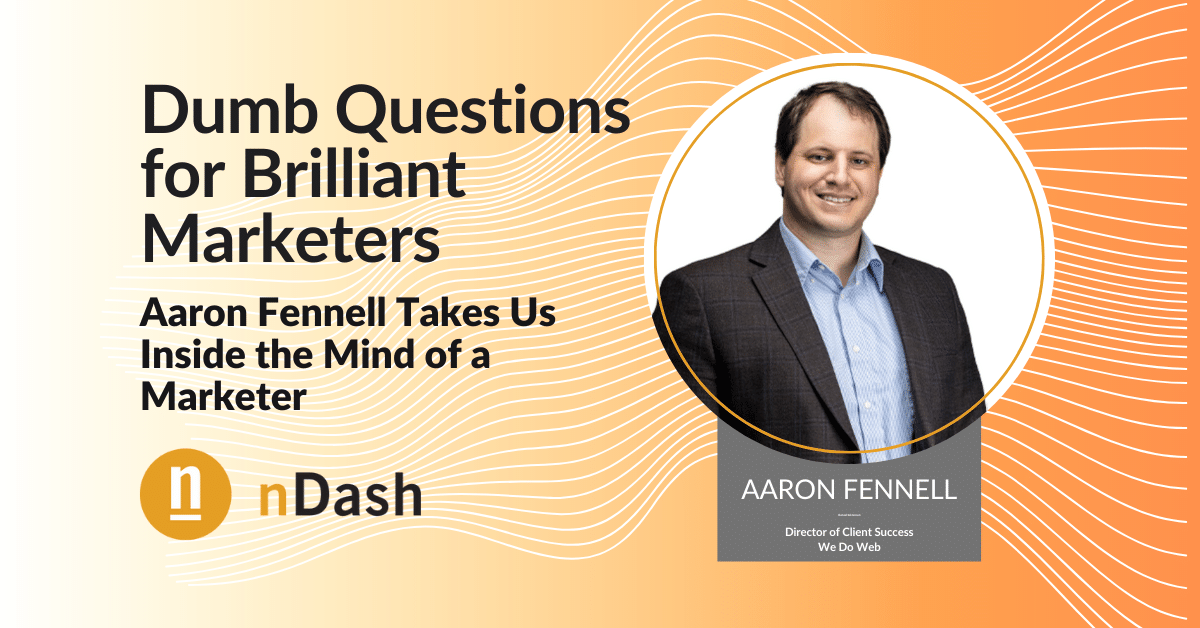In our latest for the “Dumb Questions for Brilliant Marketers” series, Aaron Fennell, Director of Client Success at We Do Web, talks to us about all things marketing.
Mike: WDW has (for some time) focused exclusively on helping law firms navigate the marketing landscape. How is marketing different in the legal profession versus other industries?
Aaron: Lawyers and other niche professions must make their claims in a certain way – there’s a different language. Other industries can say, “This is the best cup of coffee. That’s the best burger in town.” But a lawyer typically can’t say things like that, or they may risk running afoul of their local bar association.
Lawyers are bound by specific rules we refer to as bar marketing guidelines. That’s why we got into this niche more than 14 years ago – that need wasn’t being met. We’ve also worked with other specialized industries, like chiropractic and medical and professional organizations, with their own strict language regulations.
Mike: Do you believe some of the restrictions regarding what you can and cannot say could serve as a good barrier to entry and potentially provide a competitive advantage for your team, given your strong understanding of these rules?
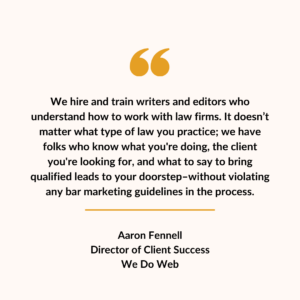 Aaron: Yes, I think it’s a competitive advantage. Many of our clients have previously worked with a marketing company for digital marketing solutions, and I believe they find a difference when working with us.
Aaron: Yes, I think it’s a competitive advantage. Many of our clients have previously worked with a marketing company for digital marketing solutions, and I believe they find a difference when working with us.
They trust the content enough that they’re willing to publish it with minimal-to-no revisions. They trust that we can speak the language correctly. It saves them time and gives them the peace of mind that we promised them in the first place.
We hire and train writers and editors who understand how to work with law firms. It doesn’t matter what type of law you practice; we have folks who know what you’re doing, the client you’re looking for, and what to say to bring qualified leads to your doorstep–without violating any bar marketing guidelines in the process.
Mike: Do you see the trend of agencies becoming more and more specialized?
Aaron: There will always be a place for folks to try to carve out certain niche experiences. That’s especially true when they see that the existing aggregate solutions aren’t serving somebody.
I think many people do broad-spectrum targeting. When the performance isn’t what they expect, though, many industries find value in looking for people who focus on their area of expertise because they’re not seeing the results they’re hoping for from a more generalized approach. For a large company that does everything, a niche business might just be a forgettable outlier.
We can see exactly why a strategy isn’t working for a particular industry. Often, it doesn’t align well with what needs to be done to get specific clients. We’re not trying to get general people into the building; we’re trying to get specific people into the building.
These are people who have a case, people who qualify for legal assistance. You have to talk about it in a way that the law firm will stand behind and in a way that will stand up under scrutiny from all the other law firms trying to edge out their competition.
It’s a very competitive landscape for advertising. There are a ton of lawyers, and they’re all throwing money at advertising. So, you must do something special to stand out. You need to know what you’re doing.
Mike: We Do Web works with some of the really big law firms. What do their in-house marketing teams look like?
Aaron: It depends on the law firm. Very few lawyers got into lawyering to run a business. They’ve learned throughout their career that they’re entrepreneurs as well as lawyers. They have to figure out things like accounting, HR, and everything else that goes with running a company. Typically all the things they didn’t want to get into when they decided to practice law.
Lawyers got into law to help people solve problems. That might mean anything from defending people accused of crimes to helping people who have gotten in a car accident and can’t figure out how to pay their bills.
There are many practice areas in the legal industry, but one thing they have in common is that all lawyers provide a service. They want to focus their attention on that, not on advertising. They don’t want to be running their content arm; they want to hire that out. It’s inordinately expensive to staff up enough to do it yourself. It’s complicated and has a logistical strain on everyone else involved in running the business.
Mike: Agencies are usually working with a director of marketing or CMO. Are the law firms you’re working with structured the same way? Or is it a different makeup than the B2B tech world?
Aaron: Large companies tend to have a marketing director or a similar role. However, they don’t always have a comprehensive marketing team under them. In those cases, the marketing director will be the point of contact with the various vendors they work with.
Some law firms don’t want to have a marketing director, either. It’s not uncommon to have the attorneys themselves in the room when we’re having marketing conversations. They’re making direct decisions right there about what’s being said. They want to be invested in the brand. It’s usually them – it’s their name, it’s their person that’s being advertised. They want to ensure that their brand is protected and well stewarded and that they agree with things said in their name.
Mike: When law firms come to you, how educated are they on what they must do? Do you find that you have to sell them on these tactics and solutions? Are they pretty aware of what’s missing in their marketing?
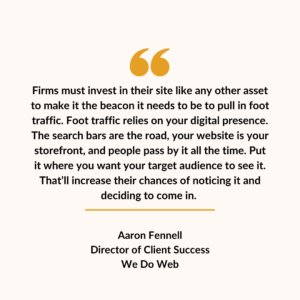 Aaron: Most law firms have a firm grasp on every form of marketing except organic. We spend a lot of time helping our clients understand the ROI and how branding and organic work together.
Aaron: Most law firms have a firm grasp on every form of marketing except organic. We spend a lot of time helping our clients understand the ROI and how branding and organic work together.
When a lawyer or law firm approaches us and says they want to discuss their digital marketing strategy, we typically start with a site audit. That’s when We Do Web’s owner, Alex Valencia, engages with them on a live video conference or in person if they’re near the Fort Lauderdale office.
We’ll sit them down and say, “Here’s your website; here’s what Google thinks you do, where it thinks you do it, and who it thinks you serve. Here are the people Google shows your website to. Is this aligned with your goals?”
Nine times out of ten, it’s not. We’ll talk about why that’s the case. Typically, it’s because the law firm hasn’t invested appropriately in digital marketing solutions. That doesn’t mean they’re not invested at all, though. Almost all lawyers know they must spend something on advertising to stay competitive.
But what they don’t necessarily know is that their website, in particular, is an asset. That’s the value proposition.
Firms must invest in their site like any other asset to make it the beacon it needs to be to pull in foot traffic. Foot traffic relies on your digital presence. The search bars are the road, your website is your storefront, and people pass by it all the time. Put it where you want your target audience to see it. That’ll increase their chances of noticing it and deciding to come in. We often say the people who need your service are already looking for you. All we’re doing is making it easier for your clients to find you.
Mike: Can you tell me a little about your SEO background and when you got into that side of the game?
Aaron: So, I’m not an SEO tech. I’ve never been on the analyst side of things. I entered this world as a marketing professional who did communications and marketing campaigns. I worked for LivingSocial for a while, a company like Groupon, about ten years ago. I’ve also worked for other niche industries afterward, which gave me insight into how this industry worked. Although I hadn’t worked in the legal industry previously, I had gained experience in academia, medical journals, a military newspaper, and the banking and FinTech sectors.
When I transitioned into the legal marketing industry, it presented itself as another interesting challenge to explore. I wanted to learn, “How does this particular industry operate? How can we get them where they want to go in this unique and interesting landscape?” I was initially involved in the content production side of things. I was doing editing, and then I was managing and editing.
Now, I’m the Director of Client Success. I collaborate with our account managers to ensure clients’ deliverables and goals are met. We strive to keep them satisfied and ensure we’re getting them where they want to go. My background has always been in problem-solving, just in different ways.
Mike: On the SEO side, even though it’s not your entire focus, it’s a big part of your work. I follow SEO Twitter closely, reading all the articles and seeing what Google’s doing. I think people can get a sense of what things change every three to six months – they change radically. Is that the case? Are there fundamentals that never change? Are there some things around the periphery that do? What have you seen?
Aaron: It’s a living, breathing thing. SEO best practices change constantly because the algorithms are constantly changing. Those changes make it harder for bad actors to get the ranking they don’t deserve. Many companies offer what we would consider black hat SEO services. The idea there – which I in no way endorse–is to give your company a rapid infusion that’ll work until the moment you get caught.
When caught using a black hat strategy, rankings decline swiftly. We avoid this by providing white hat services. Unfortunately, effective strategies tend to be quickly exploited.
Google and Microsoft will adjust their search engine algorithms to ensure that people searching for things can find what they’re looking for easily, so they’ll keep using the search engine to find things in the future.
For example, suppose an actor managed to get their burger shop to rank number one when someone was looking for a McDonald’s. That would be bad for everyone except that burger shop. Google wants you to know that when you search McDonald’s, that’s what you’ll find.
The algorithm is constantly updated with both significant and minor adjustments. Our team closely monitors these trends, adapting our content strategy accordingly. For major changes, ample communication is provided beforehand, allowing us to prepare for any potential impact.
We can prepare you to weather that storm with minimal disruption to your ranking. It’s an opportunity to gain ground against competitors who aren’t well-prepared for that change.
Ranking declines often occur due to algorithm changes. If unprepared, websites may lose substantial authority for various reasons. Our team can help restore that authority, positioning your site where it belongs and ensuring Google recognizes you as a trusted source for your target keywords.
Mike: Are some of those repairs more technical, or are they things like the content? For example, types of content discussed or written about on the site versus how things are structured.
Aaron: So, it varies. Many updates that need to happen must occur on the back end. People will go into the website, pop the hood, and adjust things to align with what the crawlers are looking for. Google doesn’t read websites. It has crawlers that look for things. They see a different version than you do when you look at the website. It’s built just for them.
Your site needs to indicate, “Yes, I’m a real website, and I’m a real authority figure. I’m located here with a real office and a real presence. I’m a lawyer, and I have degrees. And I’m credentialed and have clients.”
This is where content comes into play. Changes involving keyword density, specific header types, tags within content, or links with varying authority levels can impact content performance. These adjustments directly influence how the content is ranked in search results.
We’re constantly looking into things like, “What’s the perfect average length of an article to ensure that you’re ranking properly?” That number has fluctuated wildly. Years ago, it was around 500 words. Now, it’s trending sharply upward. That said, what Google really cares about is you answering the user’s question. If you can provide a valuable reply in fewer words, that’s still a net positive for your site’s authority.
Mike: Now, if you had to break down as a percentage of the efforts and work you put into a client, how much is like net new creation versus optimizing the existing things?
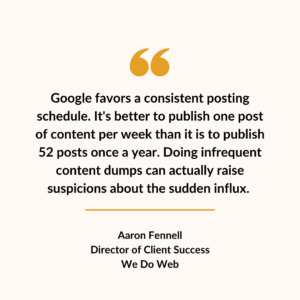 Aaron: That depends on how established the client is. One of the initial steps we take when collaborating with a new or potential client is to assess the number of indexed pages they possess. By examining this metric, we can better gauge the level of effort required to help them reach their goals.
Aaron: That depends on how established the client is. One of the initial steps we take when collaborating with a new or potential client is to assess the number of indexed pages they possess. By examining this metric, we can better gauge the level of effort required to help them reach their goals.
A well-established website with thousands of indexed pages may not require a lot of new content unless they’re venturing into a new field or location. In those cases, we focus on refreshing the content they already have to better meet current best practices or to remove pages that cannibalize each other and damage your page’s authority. But even then, we’d typically recommend publishing at least some amount of new content regularly.
Google favors a consistent posting schedule. It’s better to publish one post of content per week than it is to publish 52 posts once a year. Doing infrequent content dumps can actually raise suspicions about the sudden influx.
Typically, even well-established clients prefer not to allocate their entire content quota to revisions, updates, or similar modifications. They also want new content, which is helpful to their overall strategy. As I said, maintaining a steady content cadence is crucial for optimizing one’s online presence.
Mike: So, the number of keywords – you mentioned talking to a company, and they say, “These are the five that we want to rank for.” Is that a magic number? Or is that a realistic goal for companies to have five keywords and just really go after those?
Aaron: I wouldn’t say there’s a magic number of keywords for law firms. What they need to be focusing on are the practice areas they care about the most in the locations where they want to do business.
Location and practice area targeting is vital to legal marketing. Law firms are somewhat unique among service providers because they can’t represent anyone anywhere; they can typically only serve within a limited jurisdiction, and this restricts the clients they want to attract. As a result, keyword targeting focuses on “How can I attract individuals in this specific location radius who have cases relevant to this law firm’s practice areas? I want them to come through the door and discuss their situation with this legal team.”
Mike: So, on the tech stack side of things — we work with many HubSpot agencies, and they’re all on that platform. We also work with a lot of Drupal agencies. Is We Do Web tech stack agnostic? For example, could the companies you work with be on different platforms?
Aaron: Yeah, we work with folks regardless of their platform. We work with what they have and optimize the process to streamline workflows. When they start working with any digital marketing company, they have to give certain access to their back end to the team, so there’s always a period of transition while we set everything up at the start of a new relationship.
Typically, our involvement on the tech stack side of things includes providing suggestions and recommendations tailored to the client’s needs. For example, if they don’t have a call-tracking system, we might suggest implementing one. We have experience with several platforms that facilitate this service. The rationale behind using a call tracking platform is to gain insights into the origin of calls and record conversations. This enables the business owner to address potential intake issues and assess the quality of leads tied to specific marketing efforts.
Often we hear, “How do I know the people calling me wouldn’t have anyway? How do I know the content you wrote got them here?” We have ways of correlating the two. We can track whether a particular person came on the website and filled out a form. In many cases, we can build the user journey to demonstrate the efficacy of what they’re doing.
Mike: Big trends in the marketing space – whether it’s SEO or AI – what’s interesting these days?
Aaron: That’s the big one. Everyone’s talking about AI right now. We’re not unique in figuring out, “How does this play in the next generation of tools that get developed?” Many people are discussing whether AI will replace content creators, and I don’t think we’re there yet, and we might never be. We don’t plan on phasing out human creators. We’ve been using HI (human intelligence) a lot to create things. And we do that with a purpose.
I wish I could remember the source, but somebody talked about this for law firms. Their conclusion was – AI won’t replace lawyers. AI will replace lawyers who don’t use AI. The idea is just like how computers replaced typewriters. But you still need somebody to type.
We’re seeing that now. There’s an emergence of sophisticated language models generating realistic-sounding content. However, AI-generated content can often be misleading, which poses a significant risk in legal and medical contexts. Our client base must have accurate information, as inaccuracies are dangerous. For example, if an AI inaccurately states that the statute of limitations is three years instead of two, it could potentially lead to losing a case. Sometimes AI presents something that’s out of date or makes incorrect assumptions.
So we’re looking into how AI can help us with ideation and research. For example, someone might Google, “Talk to me about truck accident litigation in Pennsylvania.” Instead of that search, they can ask an AI, “What are the five biggest truck accident cases in Pennsylvania in the last ten years?” Then, the tool would show us case numbers and links. That’s where I think it’s going. Where searching and researching are easier, but you still need somebody to put it together into a valuable product.
Mike: By the time AI gets the adoption that everyone’s promising, it might not even be ChatGPT. It might be Google, Microsoft, or Amazon – we don’t know.
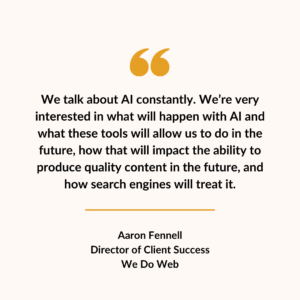 Aaron: For sure! And even players you haven’t heard of yet. Nobody knew what ChatGPT was in the broader community until just recently. I’ve been going back and forth with colleagues, peers, and even competitors about this. We talk about AI constantly. We’re very interested in what will happen with AI and what these tools will allow us to do in the future, how that will impact the ability to produce quality content in the future, and how search engines will treat it.
Aaron: For sure! And even players you haven’t heard of yet. Nobody knew what ChatGPT was in the broader community until just recently. I’ve been going back and forth with colleagues, peers, and even competitors about this. We talk about AI constantly. We’re very interested in what will happen with AI and what these tools will allow us to do in the future, how that will impact the ability to produce quality content in the future, and how search engines will treat it.
For example, suppose Google were to decide, “Our bots can detect AI-generated content, and we will disavow it.” That would be a huge change to the ability to use the tool, and they could do that at any time. So we’re very aware of that sort of Sword of Damocles hanging over the whole endeavor right now.
Mike: We’re hearing a lot of talk about people using the tool and theorizing about it. However, I’ve yet to see anyone go all in with the use case people discuss. Buzzfeed mentioned that they’re doing it, but there hasn’t been much follow-up. So, I think everyone is waiting to see if other organizations will start doing this. Is Google going to penalize it? I think we’re in a hype circle – a big waiting game.
Aaron: But no one wants to be the first person out the gate with a product that might do something illegal, immoral, or embarrassing.
If someone publishes a medical article recommending a dangerous activity, like using an EpiPen in the eye rather than the thigh, the consequences would be dire. This could lead to loss of life, and the author could be sued. While this example probably won’t happen, similar situations could arise. So, people are understandably cautious, wanting to avoid being the first to experience such ramifications. There is uncertainty surrounding the potential penalties, whether they’ll be manageable fines or substantial enough to risk bankruptcy. So, it’s natural for individuals to be skeptical and wait to see what happens.
Businesses also find the cost savings differ from what they hoped they’d be. So again, we’re not quite there yet. And I think it’ll end up being more of a research tool in the long run.
Mike: 2021 is the latest [time period most chatbots know about].
Aaron: Yes, that’s true – the cut-off matters. If you don’t exist in Google – you don’t exist. You need to position in the top 10 because no one goes to page two. Like, a commonly understood SEO goal is to make sure you’re in the top position for whatever you’re trying to rank for.
But I think we may be moving to a place where you need the prevailing AI to answer the question of “Who is We Do Web?” correctly, too. That’s where this tool will grow in importance, and companies will want to invest in a solution that gets them known accurately by AI.
That way, the people using it to research will get correct information about them, their brand and company, and their values. You don’t want to be accidentally associated with a competitor or somebody who has done unflattering things that have nothing to do with you. That may be another area where AI is important in the future.
About Aaron Fennell
 Aaron Fennell is the Director of Client Success at WDW. He joined the team in 2018 and now serves as the director of business process and innovation. Prior to joining WDW, Aaron held positions as a senior editor at LivingSocial, a freelance writer for the US News & World Report, and the commissioning editor for Elsevier’s clinical cancer journals portfolio.
Aaron Fennell is the Director of Client Success at WDW. He joined the team in 2018 and now serves as the director of business process and innovation. Prior to joining WDW, Aaron held positions as a senior editor at LivingSocial, a freelance writer for the US News & World Report, and the commissioning editor for Elsevier’s clinical cancer journals portfolio.
Aaron is known for his involvement in process improvements and major overhauls in various aspects of his work. He is always eager to explore ways to enhance efficiency, speed, and cost-effectiveness.
Aaron holds a degree in Journalism and Mass Communication from the University of North Carolina at Chapel Hill, where he also accidentally minored in Classical Humanities. He currently resides in southern Florida with his wife, daughter, and a highly pampered cat.
In his spare time, Aaron co-manages a small board game company called Stone Circle Games, which produces tabletop board games for all ages. Additionally, he volunteers as the director of referees for the Coral Springs Youth Soccer League.
